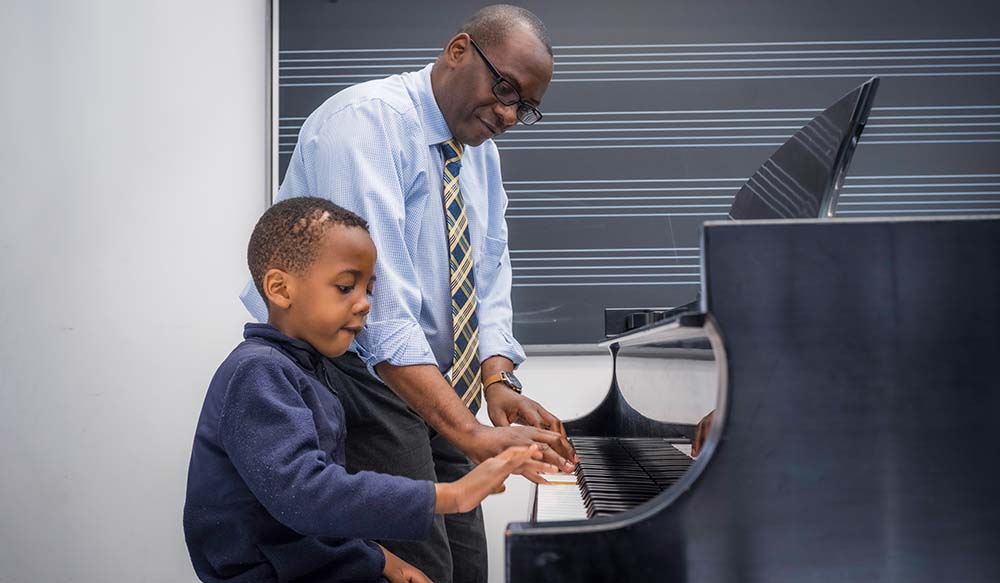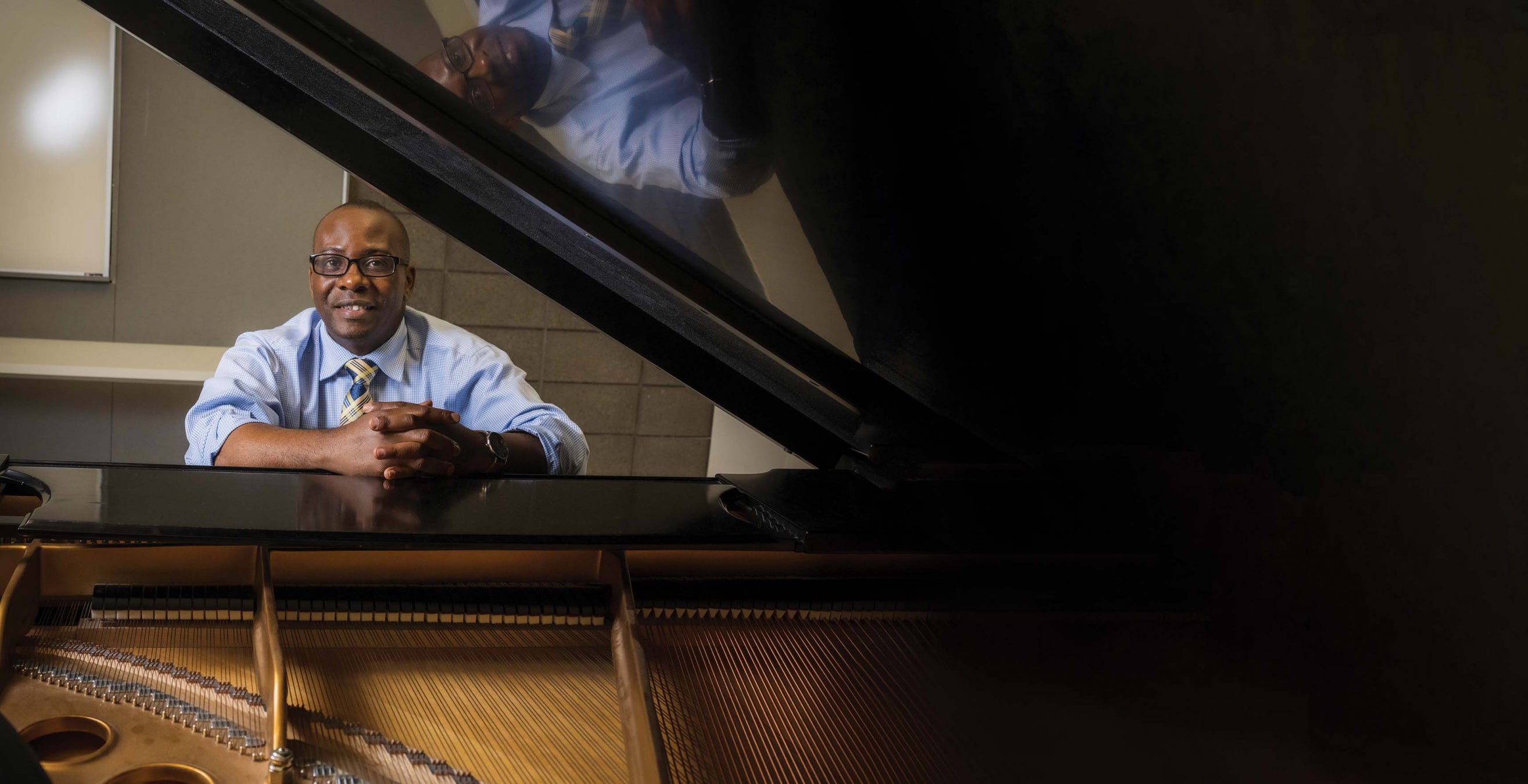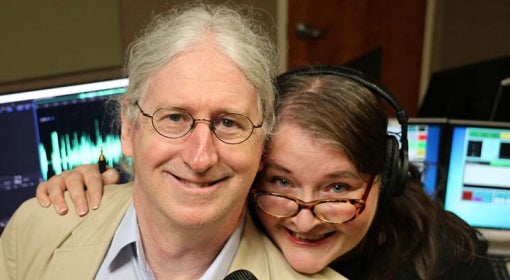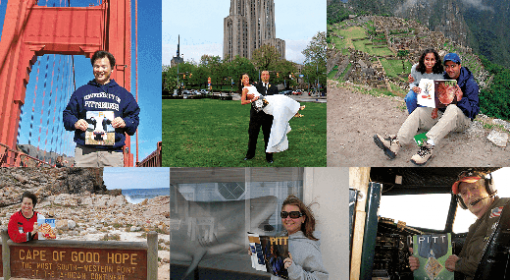The mornings in Kampala, Uganda, were busy. Guinea fowl cooed, horns honked. Bells rang, calling followers to Mass. Amid it all, Charles Lwanga’s tenor voice would rise in melody.
The music began at about 6:45 every morning during the youngster’s childhood. Lwanga’s father, a retired civil servant, would call his 13 children into the family’s living room for worship.
They would respond in Catholic prayers, and there was always song. The family would regularly sing one of their favorites, Maria, Nnyaffe (Mary, Our Mother), using Luganda, the primary language of the Baganda people of central Uganda.
After an hour, it would be time for breakfast. Their dad, who had once studied to be a priest, would ask for more of the same before day’s end, recalls Lwanga. “We would sing morning and evening. Hymns and prayers. Music was always in our home.”
It was outside of his home, too — in his school, in the community, and running through his mind with an endless, driving rhythm.
Music would pave Lwanga’s path forward. For more than half of his life, he focused on creating it. But he was always drawn to understand its meanings, too. He knew, having felt the trembling warmth of ritual and togetherness while singing with his family, that music has power. And he knew, having grown up amid Uganda’s shifting political tensions, that music’s power can spark change.
It wouldn’t be until he came to Pittsburgh that he had the opportunity to plumb the depths of what music can really do.
Lwanga was 8 years old and enrolled in boarding school when he learned to play his first instrument, the amadinda. A staple of traditional Ugandan music, it looks like a large wooden xylophone and has a bright, hollow sound. Soon after, he also learned to master the baakisimba drums, with their lightning-speed syncopation and range of tones. At the same time, he learned to understand the stories they told, how one rhythm could share a warning while another could celebrate a triumph. Within two years, Lwanga — named after a martyred Ugandan saint — became an award-winning chief drummer for the school’s choir.
What felt more important to him than accolades, though, was that he was learning the culture and collective structure of his society. In Uganda, weddings, festivals, harvests and even wars have their own specific folk songs and dances. The instruments Lwanga loved to play were often the accompaniment to those social touchstones.
Some songs came with lessons that he would absorb down deep, like his father’s beloved hymns. Much of the music spotlights the philosophy of ubuntu, a Bantu word that can translate to “I am because we are.” It’s a belief in mutual aid and collaboration and the idea that helping others is a way to help yourself.
The idea that music could say so much fascinated Lwanga. By the age of 12, he was exploring Western music and instruments, including the keyboard. He liked to discover the different ways music was enjoyed and expressed across cultures. He read that in Europe, operagoers are expected to silently observe performances, as if separate from the music. That wouldn’t fly in his home country, where ensemble performances encourage participation from all in attendance. He also explored music’s broad influence on everything from worship to politics. Songs of revolution and resistance especially interested him.
It seemed inevitable that the young man would build his life around sound. Lwanga attended Makerere University, one of Africa’s top educational institutions, where he studied music as an undergraduate before earning a master’s degree in music composition and theory. After graduating, he became a teacher there, instructing his students on African music and dance, as well as Western music theory, and working as a choral conductor, composer, pianist and percussionist.
But as full as life was, he felt something was missing.
“There was more that I wanted to say — beyond writing musical notes,” says Lwanga. “I wanted to better articulate the indigenous materials of Uganda that inform my composition approach and help people better understand the culture behind the music.”
He aspired to be an ethnomusicologist — someone who studies music’s cultural and social elements. The field is a way to not only chronicle and evaluate history but also to spotlight the artistic responses musicians have to experiences such as political upheaval and struggles for justice — two paradigms Lwanga was quite familiar with in Uganda.
The country’s recent political climate is complex — and often contentious. Since the guerilla war that followed the violent military dictatorship of Idi Amin, Uganda has been under the control of a single president. Yoweri Museveni was elected in 1986, and his adversaries claim that he is responsible for widespread corruption, particularly within the country’s electoral system. Meanwhile, conflicts along Uganda’s borders and pervasive poverty keep tensions high.
Lwanga listened to how hip-hop and the eclectic, high-spirited genre of Afrobeat were intersecting with the region’s politics and stirring activism among Uganda’s youth. He was fascinated by what he heard and inspired to explore the connections further.
The drummers pound out a rapid, vibrant rhythm. The dancers kick their feet and clap their hands. Nearly everyone smiles. This is a celebration, a traditional welcome ceremony to ring in the arrival of a new guest, Andrew N. Weintraub, a professor from the University of Pittsburgh’s Department of Music.
Lwanga is part of the special musical ensemble performing that day. His fluid, masterly performance impresses Weintraub. During a meet-and-greet not long after the concert, the two men have a chance to talk.
Lwanga discusses his ethnomusicology interests related to activism in Uganda, as well as his scholarly work in composition and Ugandan music and dance. Weintraub is intrigued. He had come to Uganda to work on his own ethnomusicological research, which focuses on a process called sound repatriation. Like Lwanga, Weintraub discerns how culture, history and all kinds of knowledge can be encoded in music. Sound repatriation is the act of returning that knowledge to the original source community by ensuring that it is in a format that is readily accessible.
The American professor perceives Lwanga’s promise and the potential value of his research.
“You should study at Pitt,” he suggests, explaining to Lwanga how the University’s program promotes an integrated approach to the study of music grounded in composition/theory, ethnomusicology, jazz studies and musicology — Lwanga could make music at Pitt and study its effect.
The Ugandan takes the idea home with him. Could this faraway place be his next verse?
He learns more about the University, its music department, its professors. He plays piano and thinks. He plays his drums and thinks. And then he acts.
In 2009, a year after meeting Weintraub, Lwanga boards an airplane for the first time. His destination: Pittsburgh, Pennsylvania.
 Lwanga arrives at Pitt to study composition and theory with support from a three-year Fulbright scholarship, the renowned program that advances international study.
Lwanga arrives at Pitt to study composition and theory with support from a three-year Fulbright scholarship, the renowned program that advances international study.
The 35-year-old composer arrives to a vibrant program. Lwanga’s gifts and heritage easily fold into the Department of Music, where a range of studies show that music is global and deeply related to social elements. But the musician and teacher is so enthused by the courses in ethnomusicology — including a seminar with Weintraub, which explores music and post-colonialism — that he adds more of it to his study.
At its core, ethnomusicology is the study of music from a variety of cultural and social perspectives. It answers the questions of how people engage with music. It speaks to how people use music to alter their social constraints. It reminds Lwanga of his early exposure to traditional music and Catholicism, how music opened him up to vastly different worldviews. He’s eager to study the dynamics of how music in contemporary Uganda gives voice and visibility to those marginalized by ethnicity, sexual identity, and economic and political oppression.
Seeing Lwanga’s passion, Weintraub proposes he consider a double major, adding ethnomusicology to his work in composition and theory.
However, if Lwanga wants to continue with music theory, composition and ethnomusicology, it would entail two separate doctoral studies. He’d have to complete one, then begin another — doing two sets of all degree requirements: coursework, comprehensive exams, prospectuses and dissertations. It’s a commitment that could take a decade or so to fulfill.
Undaunted, he decides to go for it.
He earns his first doctoral degree — a study of composition for acoustic and electroacoustic ensembles and music theory — in three years. By the fall of 2012, he begins his second doctoral project, working with Weintraub as his adviser.
Lwanga is a nontraditional graduate student. He’s older, he’s a parent, and his past music and teaching experience bind him and Weintraub into a unique academic duet. Weintraub, perhaps more than others, understands Lwanga’s work and its intersections with politics, sociology and anthropology.
As Lwanga dives into his studies, he sees Weintraub’s challenges and critiques as “a sign of his respect and as a vote of confidence.” For this, Lwanga says, “I refer to him as the man who changed my life, part of which had to do with his expectations of me.”
As he pushes forward, the graduate student’s explorations of contemporary popular music, in a sense, remain connected to the Ugandan practice of call and response, a cultural tradition rooted in participatory interaction. Lwanga looks closely at modern music, studying its melodic and rhythmic structure and how sharing on the internet and urban radio stirs debate, calling to the spirit, mind and body of those who hear the sonic messages and respond by creating communities in search of change.
Lwanga’s years of field research in Kampala take him into dancehalls; concerts; political rallies; and conversations with fans, producers and musicians, including the young Ugandan activist and musician Bobi Wine and the collectives that have been inspired by popular music in Uganda.
Wine — his birth name Robert Kyagulanyi Ssentamu — had been a student of Lwanga’s at Makerere University. The scholar watched as Wine became one of Uganda’s most popular musicians with top radio hits and even a featured song in the soundtrack of the 2016 Disney movie “Queen of Katwe.” Wine increasingly used his Afrobeat music to not only rally bodies to the dance floor but to also mobilize a “people-power” movement that made audible — or gave voice to — the concerns of urban youth, the impoverished and other disenfranchised groups.
From Pittsburgh, Lwanga observed how the people’s power helped Wine become a member of Parliament in 2017 and then a popular candidate for president in Uganda’s 2021 election. He lost to the incumbent Yoweri Museveni, a result that Wine and a large section of the public strongly dispute. His activism, spread in part through his music, continues to make waves.
Wine’s societal impact underscores the importance of Lwanga’s work to understand how music can contribute to all kinds of change. And his extensive research on Ugandan popular music, politics and participation hasn’t gone unnoticed. In 2014 and 2018, he won the annual African Libraries Student Paper Prize, awarded by the African Music section of the renowned ethnomusicology organization Society for Ethnomusicology (SEM) to the best student paper on the topic of African and/or African diaspora music.
He’s been recognized in composition, too. In 2015, he won the Robert M. Stevenson Prize, which is awarded by SEM biennially to the best composition by an ethnomusicologist.
In Pittsburgh, Lwanga built his life around understanding music — and making it, too.
In 2020 — after eight more years and many sessions with Weintraub — Lwanga completed his doctorate in ethnomusicology — his second PhD. Soon, after a cumulative 11-year stay in Pittsburgh, he was packing again, taking particular care in boxing up his 40-pound, large wooden amadinda, on which he still plays Ugandan folk songs.
Now a faculty member at the University of Michigan, he’s a tenure-track assistant professor poised to be influential in ethnomusicology and African studies for years to come. Lwanga is also writing a book based on Wine, who remains a strong opposition leader, musician and political figure in Uganda.
Lwanga says he is teaching his students what he once taught Wine: that ideas are embedded in music. He’s convinced that when music is full of compassion and humanity, it can teach, inspire and serve as a call to action, just as it has done for him. After all, it was those early morning hymns he once sang with his family that put him on a path to Pitt, more than 7,000 miles from his childhood home, and to explorations into how music can lead to enlightening insights on the past, present and future of Uganda and all societies.
Listen Up
Interested in a short course on what’s on the minds and in the music of a few of the most popular contemporary Ugandan musicians? Prof. Charles Lwanga recommends listening to the following artists. Afterward, check out the Soundcloud links to a few recordings produced by Lwanga.
“Freedom” by Bobi Wine:
“Ikumabo” by Jackie Chandiru:
“Don't be Like” by Joh Blaq:
“People Power” by Bosmic Otim:
“Wire Wire” by Bebe Cool:
Plus . . .
Add some of Lwanga's own compositions to your playlist.
“Argumentative Clues”
“FM Sukus for Electronics”
“Mwe Abazira (You Great Heroes)”
“‘Best Be’ for Spoken Text and Electronics”
“Silence and Suspense for Cello solo”
This story was posted on January 14, 2022. It is from Pitt Magazine’s Winter ’21-’22 issue, which will be mailed in January 2022.





